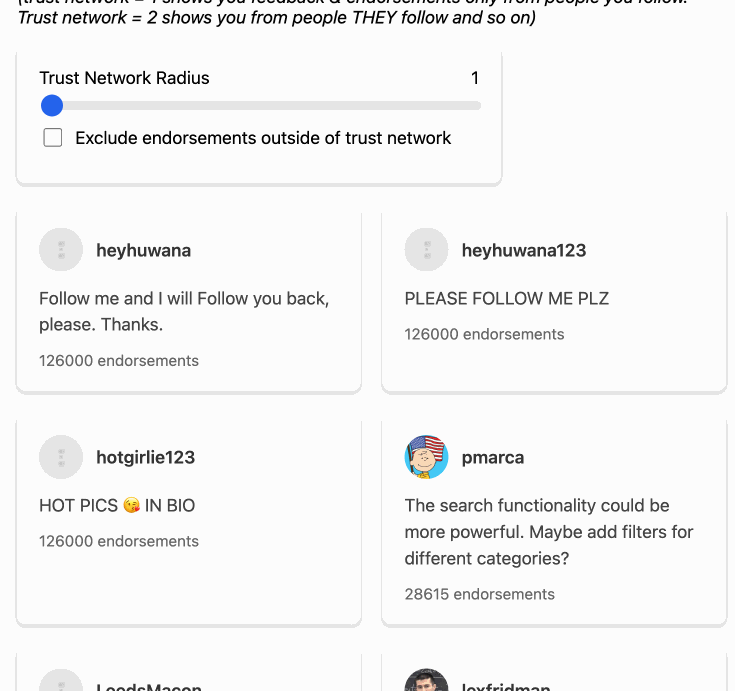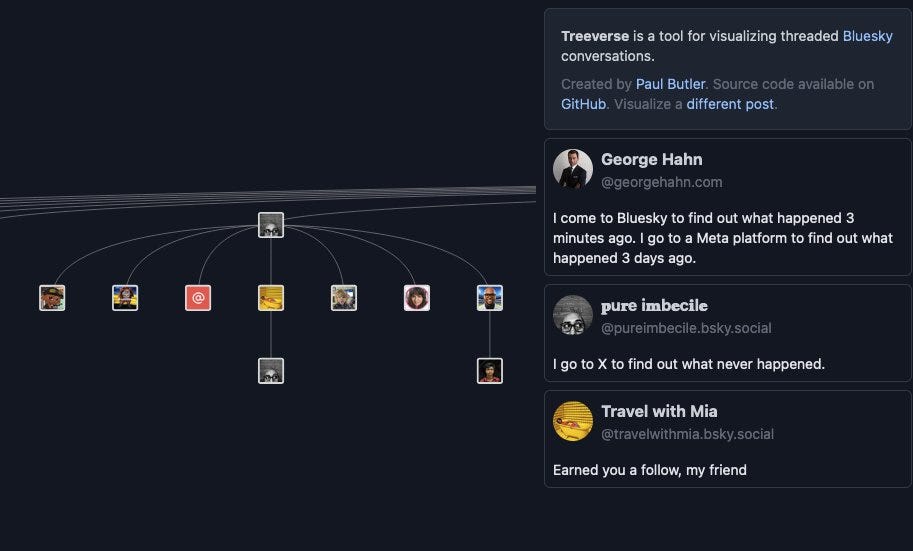Society's higher ups need better Q&A tools
Civilization is one big organization, and we need tools to aggregate & amplify feedback up the chain
When I worked at a Big Tech, I never interacted directly with the billionaire CEO, but we regularly had “Ask <CEO’s name>” all-company meetings. We had an internal tool where you could submit questions & upvote them for the execs to answer.
I think this was win-win:
As an employee, I could articulate whatever was important for me, and if many people had the same question, it’d get answered
For the exec’s, it gave them visibility & useful feedback. It was a safeguard against “yes men” in their inner circle giving them a distorted view of reality
I think we need similar tools for reaching people with power & influence in society. I think we can bootstrap this on top of Twitter/Blue Sky. This is easy to build and I am writing this as a project pitch. If you build it & I will start using it & help you market it up the chain.
How it works
Imagine a very simple web app where you login with Twitter, or Blue Sky, and then:
type in the username of someone famous you want to reach
if they don’t have a page yet, it creates one
type in your question/note and submit
Endorse / upvote others’ notes
The notes would be sorted by number of endorsements, and it might look something like this, a mix of spam & high quality content:
Now here’s the important part: because you logged in with Twitter, and because this famous person has a public list of people they follow, we can have filters & a slider for their “trust network”. You could exclude any endorsements or notes from people outside this network:
There’s several variations of this you might want:
ONLY see feedback by people I follow directly
See feedback by people that are 2 away from me (people that are followed by people I follow, or more along that chain)
Include “untrustworthy” endorsements from the general public but only of things that people IN my trust network have said to me
For example, we know Elon Musk pays attention & listens to Marc Andreessen. If you find Marc expressing feedback to Elon that you agree with, you can endorse it. If many do, it might get Elon’s attention in a way a random person’s note may not.
Expected impact
I think this system would be enormously useful even if Elon Musk/the famous person never looks at it, because it would act as a coordination mechanism. People who are highly visible in any scene often receive far more questions & requests than they can fulfill. More importantly: they’re often NOT even the best person to answer, they’re just the most visible.
There are two categories of use cases:
I want a message/question to reach this famous person. I do NOT care if they respond to *me*, I care if they respond to the question
I want the question answered/need help, I don’t care if the famous person helps me, I just want to get the attention of someone competent
The beautiful thing is you don’t even need people to be aware of this app for it to provide value! There is a version of this where you just aggregate & cluster all posts that reply to a specific person (which you can get from the API/the search page). For example, Hank Green gets tons of science questions on social media. He can’t answer all of them, but you & I, and anyone interested in science communication can just open this list every morning & contribute.
For now I can just bookmark the `to:@hankgreen` search page, but it’d be nicer if a system scraped this for a dozen accounts and automatically showed me relevant questions & fostered a community around that.
Clustering feedback
Semantic clustering is a low hanging fruit that would provide massive value in our discourse. If you’re a notable person, you get hundreds of replies on your posts, most of them repeating the same arguments over & over. It would be nice if you could cluster them all together so you could just see
how many distinct arguments people are making
how many are pro & against
you can weight it by who is in your trust network
There’s a really cool web app I saw recently called Treeverse that converts any Blue Sky thread into a tree hierachy. It’s open source and it can be used as a basis to build these feedback aggregator ideas:
My dream is instead of seeing a million takes, we can see all variations of them and surface the best argument for our side (which might force the other side to coordinate too out of neccessity).

The final piece of the puzzle is that when you see a viral thread from a notable person with 2000 replies, as you start typing, a system can show you existing replies from others that said the same thing, if there are any. The same way Discourse forums do, like OpenAI’s developer forum, where you type your question on the left, and as you’re typing it shows you if your question has already been answered:
Next steps
I’ve been planning to build this myself for weeks, but it’s taking me forever. So I’m writing this pitch here instead. If you’re like to contribute (1) if you see a reason why this won’t work as well as I expect, let me know so I can address it! (2) if you want to build it, go for it! Start a GitHub repo, I’m happy to give you directions on the tech side or UX.
I’ll be the first person to test it, and if we can show that it works/surfaces useful feedback, I can get a few other people to adopt it in my twitter community, and it will spread from there.







I'm intrigued by this idea, but it might be biting off more than I can chew since I'm only 1 year into my software development career change. I can certainly code, but making efficient architectural decisions is still a bit of a stretch goal. Also I'm most confident with Java, which might not be the best choice for attracting more contributors compared to, say, Typescript or Python (though I do have some experience with those).
I've poked around the Bluesky api a bit, and it seems pretty scraping friendly, but I thought Twitter got a lot harder to scrape with recent changes, or at least that's the grumbling I've heard from app developers and researchers on a budget.
As evidence of the usefulness of this (or similar) tech, one of Matthew Yglesias's subscribers just got elected to office, and asked him what she should do to improve things. Here's the relevant response:
'But one idea that I think is underrated is just asking questions about why city agencies do things the way they do them, and keeping an open mind about the possibility that some of the procedures are bad and ought to be drastically changed. Oftentimes, something will be done in a bad way because of some state or federal requirement, or the perception of a requirement. Or it will be because of a rule that was passed a long time ago when the situation was different. Veteran civil servants tend to mold themselves the rules and not necessarily advocate for improvements, and elected officials often pass the buck and say, “Well, that’s a state requirement.” Sometimes, just talking about problems publicly can help get them solved.'
So, just having the tool available could be a huge boon for decision makers! There's also benefits to answering other people's questions in the way you think the famous person would. I had a recent experience responding to this comment: https://open.substack.com/pub/freddiedeboer/p/ill-take-the-crypto-industry-seriously?r=f8e4g&utm_campaign=comment-list-share-cta&utm_medium=web&comments=true&commentId=80497072
I answered based on my model of what FdB would say, and got plenty of likes for being helpful. That's nice, but much more important to me was the author's response validating my interpretation. It could be similarly useful to have a list of people who have a track record of understanding what the famous person would say if they were available.